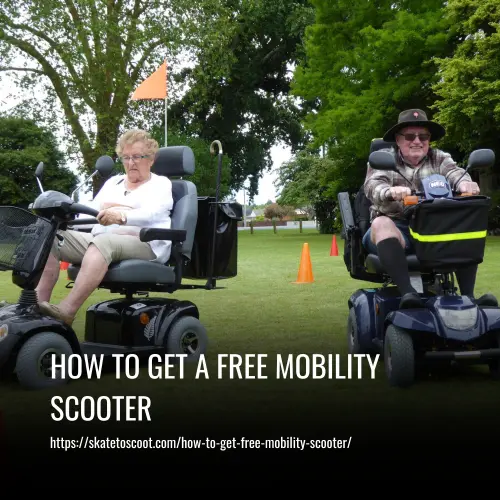How to Get a Free Mobility Scooter
This post contains affiliate links. As an Amazon Associate, we earn from qualifying purchases.
To get a free mobility scooter, there are several options available. One way is to check with nonprofit organizations or charities that provide assistance to individuals with limited mobility. These organizations often have programs or funding specifically designated for the provision of mobility scooters and other assistive devices.
Additionally, individuals with disabilities may be eligible for support through federal programs such as Social Security Disability Insurance. Another option is to explore financial assistance programs offered by health insurance companies or insurance providers, as some may cover the cost of mobility scooters as durable medical equipment.
Lastly, some mobility scooter manufacturers offer sponsorship programs or discounts to individuals with mobility issues. It is important to research and inquire about eligibility requirements and the application process for these various avenues of obtaining a free mobility scooter.

Different Ways to Get a Free Mobility Scooter
Mobility scooters can greatly improve the quality of life for individuals with limited mobility due to medical conditions or disabilities. However, the cost of these devices can be a barrier for many people. Fortunately, there are several ways to obtain a free mobility scooter.
Here we will explore different options for getting a free mobility scooter, including government programs, insurance coverage, nonprofit organizations, and other funding sources.
1. Medicare
Medicare is a national health insurance program that covers durable medical equipment for medical conditions. While Medicare typically covers 80% of the cost of a mobility scooter, the remaining 20% can still be a significant expense.
However, individuals with a Medicare supplemental policy may be able to have the entire cost covered. It is essential to check with Medicare to understand your policy’s coverage and explore savings programs that can help cover the remaining cost.
2. Veteran Programs
The Department of Veterans Affairs offers assistance to veterans to cover the entire cost of mobility scooters. You will need proof from your doctor of a mobility issue and the need for assistive devices.
3. Medicaid
Medicaid is a federal and state insurance program that may cover the cost of mobility scooters. Eligibility requirements vary by state, but you will typically need a prescription from your doctor to prove the necessity of the scooter.
4. Insurance Company
Private health insurance policies may cover mobility scooters under specific circumstances. Checking your policy’s coverage for medical aids or devices is essential. If your claim is denied, you can write an appeal to the insurance company.
5. Social Security
People with disabilities can apply for state disability or social security payments, which may provide benefits to cover the cost of a mobility scooter. Application processes can vary across states, and it is important to check the eligibility requirements before applying.
6. American Outreach Foundation
This foundation assists low-income families and veterans in need of mobility aids. Submit proof of income, a doctor’s prescription, and show that you were denied aid by your insurer.
7. Charities
Several charities offer financial assistance for mobility aids, including mobility scooters. Applying to these organizations generally requires filling out an application and providing proof of need and insurance denial.
8. Grants
Grants can be a source of funding for a mobility aid when insurance coverage is insufficient. Research online or consult local organizations to identify grant opportunities available in your area.
9. National Multiple Sclerosis Society
The National Multiple Sclerosis Society supports individuals with Multiple Sclerosis who require mobility assistive aids. Doctors’ proof of need, scooter manufacturers’ accreditation, and seller accreditation are typically required to qualify for a free scooter.
10. Latter-Day Saint Charities
Latter-Day Saint Charities offers free mobility scooters and provides repair services. These charities aim to assist individuals who cannot afford their own mobility aids.
11. Churches and Organizations
Some churches and organizations have programs that provide aid to individuals with limited mobility. Inquire with local organizations or your local church to explore potential assistance programs.
12. Fundraisers
Creating a fundraising campaign on platforms like GoFundMe can help raise money to cover the cost of a mobility scooter. Utilizing social media and reaching out to generous individuals can significantly aid in achieving the campaign’s goal.
These are just a few ways to obtain a free mobility scooter. Remember to research and explore all available options to find the best solution for your specific situation.
How Do I Qualify for a Mobility Scooter
To qualify for a free mobility scooter, you will need to meet certain eligibility requirements, which may vary depending on the program or organization you are applying. Here are some general guidelines to keep in mind:
1. Doctor’s Prescription
You will typically need a doctor’s prescription stating that you require a mobility scooter for assistance with your limited mobility. This prescription serves as medical documentation supporting your need for the equipment.
2. Proof of Income and Medical Condition
Some programs may require you to provide proof of your income and medical condition. This could include documents such as tax returns, medical records, or a letter from your healthcare provider.
3. Face-to-Face Examination
A face-to-face examination with your doctor may be required to confirm your need for a mobility scooter. This examination helps assess your mobility issues and determines the appropriate assistive device for your condition.
4. Citizenship or Legal Residency
You will typically need to provide proof of your citizenship or legal residency in the United States. This may include a valid passport, birth certificate, or permanent residency card.
FAQs
Medicare may cover the cost of motorized scooters if certain eligibility requirements are met. Individuals with limited mobility due to a medical condition may qualify for coverage. However, it is important to note that Medicare typically considers motorized scooters as durable medical equipment and may only cover a portion of the cost.
The coverage of mobility scooters varies depending on the insurance provider and the specific policy. Some insurance companies may cover a portion of the cost of a mobility scooter, especially if it is deemed medically necessary. However, it is necessary to consult with the insurance provider to understand the coverage details.
The price of mobility scooters can vary widely depending on the make, model, features, and brand. Basic models can start at around $600, while more advanced models can cost several thousand dollars. Additionally, factors such as customization and accessories can also impact the overall cost.
Yes, assistance in acquiring a mobility scooter is available through various programs. Nonprofit organizations, federal programs, and insurance providers may offer financial assistance to individuals with mobility issues. Additionally, some organizations specialize in providing mobility aids to people with disabilities, and they may be able to help with obtaining a scooter.
The best way to get a mobility scooter is to first assess your needs and determine the appropriate type and specifications required. Next, explore potential funding sources such as insurance coverage, assistance programs, or nonprofit organizations. Research various mobility scooter manufacturers and retailers to compare prices, warranty options, and customer reviews to ensure you find a high-quality scooter that suits your specific needs.
While not everyone is entitled to a free mobility scooter, individuals with mobility issues due to a medical condition may qualify for assistance programs or funding sources that can provide them with a scooter at little or no cost. Eligibility requirements may vary depending on the specific program or funding source.
Yes, funding for a mobility scooter may be available through various financial assistance programs. These programs can include federal programs, nonprofit organizations, insurance coverage, or even sponsorship programs. Researching these options and understanding their eligibility requirements is essential in obtaining funding for a mobility scooter.
Mobility scooters are designed to assist individuals with limited mobility due to a disability or medical condition. Generally, to use a mobility scooter, one must have a medical need and obtain the necessary prescriptions, recommendations, or documentation from a medical specialist. However, the specific usage guidelines may vary depending on local regulations and laws.
The cost of mobility scooters can be attributed to several factors. These include the research, development, and manufacturing processes involved in producing high-quality, durable medical equipment. Additionally, the customization options, advanced features, and technology incorporated into modern mobility scooters also contribute to their higher price range.
Nonprofit organizations and charities may offer mobility aid programs that provide free or heavily subsidized mobility scooters to individuals in need. These programs often have specific eligibility requirements and application processes. It is recommended to research and reach out to relevant charitable organizations to inquire about their assistance programs.
Charity shops primarily sell second-hand items to raise funds for charitable causes, and their inventory is based on donations. While it is possible to find mobility scooters at charity shops, availability can be limited. Additionally, these scooters may not always be free but sold at a reduced cost compared to new ones. Checking with local charity shops and organizations that specialize in mobility aids is advisable to explore these options.
Conclusion
In conclusion, obtaining a free mobility scooter is possible through various avenues. Eligibility requirements, limited mobility, and medical conditions can be factors that qualify individuals for assistance programs or funding sources. Nonprofit organizations, federal programs, and insurance providers are among the potential sources of financial aid for obtaining a mobility scooter.
It is important to explore all available options, including sponsorship programs and mobility aid programs offered by charitable organizations. By assessing personal needs, researching mobility scooter manufacturers, and comparing prices, individuals can find the best scooter that suits their requirements.
While not everyone is entitled to a free mobility scooter, understanding the eligibility requirements and application processes of different programs can greatly increase the chances of obtaining one.
